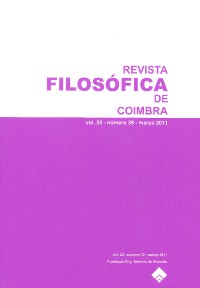Please use this identifier to cite or link to this item:
https://hdl.handle.net/10316.2/29607| Title: | Em defesa do "Fanatismo Moral" de Fichte | Authors: | Breazeale, Daniel | Keywords: | Autonomy;Freedom;Conscience;Conviction;Duty;Obligation;Norms;Reflective judgment;Action;Fanaticism;Enthusiasm;Moral deliberation;Will;Schelling;Kant;Hegel;Fichte;Autonomia;Liberdade;Consciência;Convicção;Dever;Obrigação;Normas;Juízo reflexivo;Acção;Fanatismo;Schwärmerei;Deliberação moral;Vontade;Kant;Hegel;Fichte | Issue Date: | 2011 | Publisher: | Faculdade de Letras da Universidade de Coimbra, Instituto de Estudos Filosóficos | Abstract: | A teoria moral de Fichte foi, desde o início, largamente caracterizada
e criticada como exemplo acabado de “fanatismo” ou “arrebatamento”
(Schwärmerei) moral. Foi criticada por autores como Schelling e Hegel como
sendo, por um lado, demasiado abstracta e vazia, e, por outro, demasiado
subjectiva e arbitrária. Críticos contemporâneos, como Frederick Neuhouser
e Michelle Kosch fazem eco dessas primeiras críticas e defendem que Fichte
não é capaz de apresentar uma teoria adequada da auto-determinação
substantiva (isto é, do arbítrio moral), que preserve simultaneamente a
autonomia moral e a objectividade e universalidade dos princípios morais.
Este artigo procura defender Fichte destas acusações, revisitando a sua
complexa teoria da deliberação moral, conforme desenvolvida no seu Sistema
da Ética de 1798 e na Wissenschaftslehre nova methodo (1796-99). Esta teoria
sublinha (1) a natureza dual do agente ético (como simultaneamente um eu
empírico, individual e finito, e uma expressão particular do eu universal, puro
ou infinito), (2) o carácter reflexivo da deliberação moral e (3) o carácter
concreto do juízo moral. From its inception, Fichte’s ethical theory has been widely characterized and criticized as a prime example of moral “fanaticism” or “enthusiasm” (Schärmerei). It was criticized by critics such as Schelling and Hegel as being, on the one hand, too abstract and empty, and, on the other, too subjective and arbitrary. Contemporary critics, such as Frederick Neuhouser and Michelle Kosch, echo these earlier criticisms and argue that Fichte is unable to provide an adequate account of substantive self-determination (that is, of moral choice) that simultaneously preserves both moral autonomy and the objectivity and universality of moral principles. This paper attempts to defend Fichte against these charges by revisiting his complex account of moral deliberation, as that is developed in his 1798 System of Ethics and in the Wissenschaftslehre nova methodo (1796-99). This account stresses (1.) the dual nature of the ethical agent (as at once an individual finite empirical I and a particular expression of the universal, pure or infinite I), (2.) the reflective character of moral deliberation, and (3.) the concrete character of moral judgment. |
URI: | https://hdl.handle.net/10316.2/29607 | ISSN: | 0872-0851 | DOI: | 10.14195/0872-0851_39_2 |
| Appears in Collections: | Revista Filosófica de Coimbra |
Files in This Item:
| File | Description | Size | Format | |
|---|---|---|---|---|
| rfc39_artigo3.pdf | 4.91 MB | Adobe PDF |  |
Items in DSpace are protected by copyright, with all rights reserved, unless otherwise indicated.
